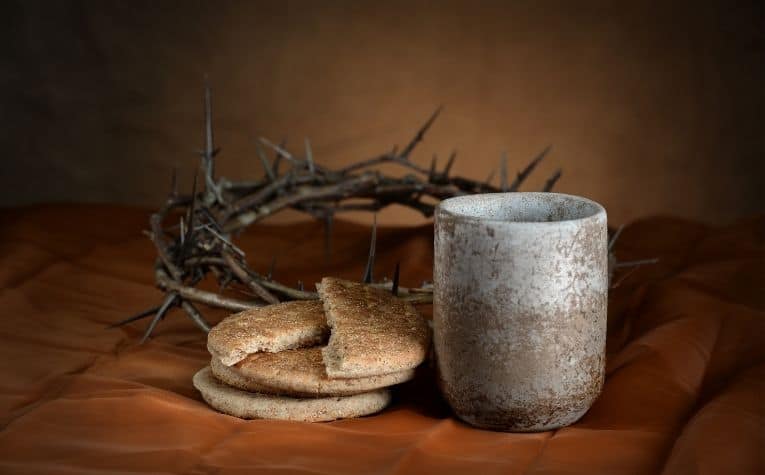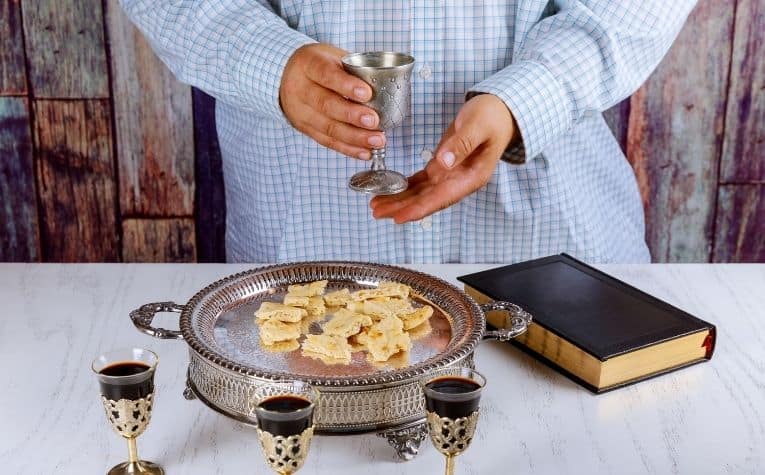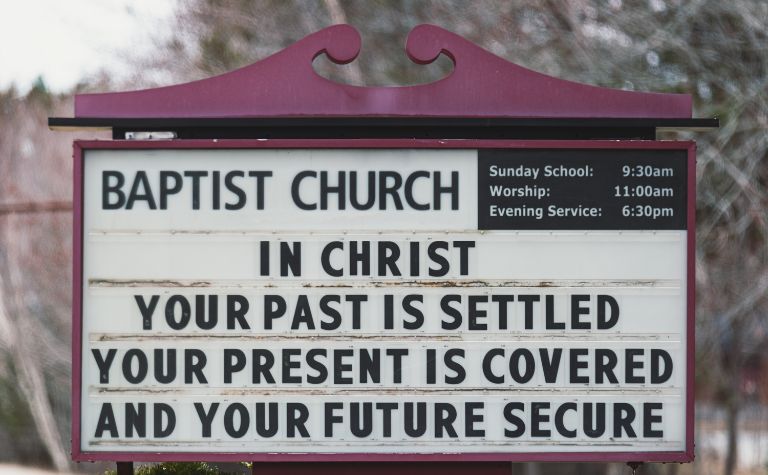Methodists and Baptists have much in common with Protestant Christian denominations, but they also have important differences. One of these differences involves the practice of communion, also called the Lord’s Supper. Because of this, many people wonder if Methodists can take communion at a Baptist church.
Methodists can take communion at a Baptist church if that particular church allows it. Most Baptist churches are independent so that each local body can make its own decision on this matter. In many Baptist churches, Christians who belong to Methodist churches would be able to take communion.
What are the similarities and differences between the Methodist and Baptist traditions when it comes to communion? What does each group believe and why? Read on to learn answers to these important questions.

Who Can Take Communion In Baptist Churches?
Communion is an important practice in Baptist churches. It is a time when Baptists collectively remember the death of Christ for their sin.
Key terms | “Communion” and “the Lord’s Supper”: These terms describe the same act and are often used interchangeably in Protestant churches. The word “communion” comes from the Latin word communion, meaning “sharing in common.” The phrase “the Lord’s Supper” is taken from the last meal Jesus shared with his disciples prior to his death (1 Cor. 11:23-26).
Baptists believe that pastors in the local church have a responsibility to lead their congregations in this practice regularly, though other people like elders and deacons may assist them in serving the congregation the bread and cup. Baptist churches serve communion differently. For example:
- Some Baptist churches observe communion weekly, others monthly, and still others, quarterly.
- Some Baptist churches serve communion in addition to a regular sermon, yet other churches make it the center of the service, though some Scripture readings are incorporated, too. But no matter how often communion is observed, the question remains, who can take it?
What Is “Open Table” and “Closed Table” Communion?
There are two ways of practicing communion in a local church, “open table” or “closed table”:
- “Open table” communion means that any professing Christian can take communion. Most Baptist churches practice “open table” communion, so a Christian who attends a Methodist church would be able to participate. What about children? When a child is old enough to have made a personal decision to follow Christ, they are allowed to take communion in most Baptist churches. (Also see This Is Why Baptists Don’t Baptize Infants)
- “Closed table” communion means that only recognized and baptized members of a particular church or denomination can participate in communion. A person who desires to partake in communion must discuss the requirements with the pastor or another church leader and receive permission to participate. (Also see What Do Baptists Believe About Salvation?)
Statistics | Southern Baptist Churches: A survey of Southern Baptist pastors found that “96 percent of their churches allow individuals who are not members of that local church to participate in the Lord’s Supper. Only 4 percent restrict participation to local church members.” [1]
Also, see First Baptist vs. Second Baptist: What’s the Difference?
The view of one Baptist theologian comes from Wayne Grudem answers the question, “Who Should Participate in the Lord’s Supper?” this way:
- Only believers should participate in communion; if a person isn’t a professing Christian, they should not partake of the elements (1 Cor. 11:29-30)
- Only believers who are willing to examine themselves (1 Cor. 11:27-29) for the purposes of loving God and loving others should participate in communion
In his book Systematic Theology, Grudem also mentions the view that holds that all who partake in communion should be baptized: The argument states that baptism is the beginning of the Christian life while communion is the continuation of it.
- Therefore, non-baptized Christians should not participate.
- Grudem argues that a non-baptized believer should be allowed to take communion and be strongly encouraged to be baptized as soon as possible. [2]
How Do Baptists Observe Communion?
The pastor often stands behind the communion table, which holds the elements, and reminds the congregation of the meaning of the elements and that Jesus instructed Christians to participate in this remembrance. The bread is consumed first, and then the cup. (Also see Can a Baptist Be a Godparent?)
The bread: Either the pastor prays “over the bread,” or another leader does. The prayer is often one of thanks for Christ substituting his own body and life for the sake of sinners and their salvation. When the prayer concludes, wafers of bread are passed out to the congregation, and people consume it.
The cup: Either the pastor prays “over the cup,” or another leader does. The prayer is often one of thanks for the blood of Christ, which cleanses people from their sins, according to the New Testament. When the prayer concludes, small communion cups are passed out to the congregation, and people drink the juice.
The return of Christ: Often, pastors end the communion table with a reminder that communion not only looks back to the death of Christ, but it also looks forward to his return, as 1 Corinthians 11:26 teaches,
What Communion Means To Methodists
Most Christians observe communion, but there isn’t agreement on how or if Christ is actually present in the bread and the cup (i.e., wine or juice).
For example, sincere believers debate what Jesus meant when he said about the bread, “this is my body, which is for you; do this in remembrance of me” (1 Cor. 11:24, NIV, emphasis added). Methodists hold to the “spiritual presence” viewpoint.
| Viewpoint | Subscribers |
|---|---|
| Transubstantiation: During communion, or the Eucharist as it’s referred to in Roman Catholicism, the bread and cup are supernaturally changed into the body and blood of Christ. Thomas Aquinas said the elements start as one substance and they transform into another. | Roman Catholicism |
| Spiritual presence: Christ is spiritually present in the bread and cup, but isn’t physically present. However, communion is more than a mere memorial (see next viewpoint). | Lutheranism |
| Spiritual presence: Christ is spiritually present in the bread and cup but isn’t physically present. However, communion is more than a mere memorial (see next viewpoint). | Methodists, others |
| Memorial: Communion is only an act of remembering Christ’s death. The elements don’t substantially change, nor are they filled with a special spiritual presence. | Baptists, others |
Key term | The Real Presence: This is the view that while Christ isn’t physically present in the communion elements, he is spiritually present. The difference between this view and the memorial view is that the memorial view doesn’t hold to any immaterial presence in the elements.
How Often Do Methodist Churches Take Communion?
- Many Methodist churches take communion once a month, usually on the first Sunday of the month. Others take it quarterly or according to another pattern of time.
- Some Methodist churches are more liturgical than others, and their worship service is more formal than others. Liturgical churches often have more traditions surrounding communion than less liturgical ones.
- How is this different from Baptist churches? Generally, it’s not different for Baptist churches because the frequency of their observance varies from church to church. Baptist churches, with some exceptions, are often less liturgical in their worship. Also, see What Does First Baptist Church Mean?
How Do Methodists Take Communion?
- Methodists commonly take communion standing up or in a kneeling position. Some people, like the elderly, may take it sitting down, such as in a pew. A wafer or piece of bread is handed to them or placed in their mouth. It’s traditional to drink from a shared cup, but more churches are opting for individual communion cups.
- How is this different from Baptist churches? Baptists are encouraged to take the elements in whatever position they want. Some kneel at the sanctuary altar, others walk to the table and take the elements back to their seat. In still other churches, church leaders pass plates of the elements down the rows where people are sitting.
Example: Communion in the United Methodist Church
As mentioned above, in Baptist churches, communion may be “open table” or “closed table,” but Methodist churches practice open table communion.
The United Methodist Church, which is the largest Methodist denomination in the world, and the second largest Protestant denomination (Southern Baptist is first) teaches that communion is an invitation into what they view as a holy sacrament.
Although the UMC states that those who participate should be baptized, they do not require it: “‘Our communion liturgy begins with words spoken on Jesus’ behalf inviting “all who love him, who earnestly repent of their sin, and seek to live in peace with one another.'” There are no conditions for church membership or completion of a class required.” [2]
Methodists believe that communion is for those who love Christ but will not question those who wish to partake in it.

Monitoring Communion
Whether a church is open or closed with regard to the communion table, its leaders would likely agree that it’s difficult to monitor or “police” the communion table. Often leaders don’t know if an individual taking communion is an unbeliever, a Baptist, or a Methodist.
Some people who don’t meet a particular church’s requirements may still participate in communion because leaders won’t catch them before they do. (Also see Can Baptists Dance?)
Often, leaders aren’t trying to “catch people” who are violating their requirements. Rather, leaders give instructions to the congregation prior to communion and rely on people’s individual honesty to follow them.
Do Baptists Serve Wine During Communion?
Most Baptist churches don’t serve wine during communion. Instead, they serve non-alcoholic grape juice. There are different reasons for this:
Some Baptists don’t drink alcohol: One significant reason is that many Baptists, at least in the United States, do not drink alcohol, whether because of personal, moral, or biblical reasons. (Also see Here’s What Baptists Believe About Drinking Alcohol)
Although there is some evidence that more Baptists are changing their view on alcohol, like Moody Bible Institute and Dallas Theological Seminary lifting their respective bans on alcohol use, Baptists as a group tend not to be drinkers [3].
This, combined with the importance of the Baptist tradition of each local congregation governing themselves, contributes in a major way to Baptists serving grape juice instead of wine during communion.
Children, who are professing believers, may participate in communion in Baptist churches, which makes offering juice to everyone more practical.
Juice was a prohibition-era adjustment: Another reason Baptist churches don’t serve wine at communion is rooted in history. During the prohibition movement, Baptists and other Christian denominations switched from using wine to using grape juice during communion. Once prohibition ended, Baptists continued the practice.

Do Methodists Drink Wine At Communion?
Like Baptists, Methodists also serve grape juice instead of wine during communion. Also, like Baptists, Methodists began using grape juice instead of wine during prohibition.
Welch’s grape juice: In fact, Charles Welch (the founder of Welch’s Grape Juice) was a Methodist businessman who marketed his non-alcoholic grape juice to denominations such as the Methodist church during prohibition for use in their communion services. [4]
Additionally, because Methodists have an open communion table and do not have minimum age qualifications, a child or alcoholic could routinely be visiting the communion table. Thus, one of the reasons Methodists use grape juice is to best care for those attending church services.
Abstention: Another reason is that at least one major Methodist denomination, The United Methodist Church, recommends that members abstain from alcohol and drugs.
The rationale is that abstaining from alcohol is a way for Christians to be a faithful witnesses to those around them. Methodists do not go so far as to say consuming alcohol is always sinful. However, they explicitly condemn the abuse of alcohol in the lives of believers and people in general.
Methodists focus on the treatment of alcoholism and push strongly for the elimination of widespread advertising of alcohol. This fits into the general Methodist principle of caring for the needs of those around them and maintaining peace with all people.
Christian Unity
When Christians are able to agree and participate in communion together, it demonstrates the unity they have on the importance of Christ’s death as an atonement for sin. Methodists and Baptists are all born sinful, and historically they each look to the cross of Christ for forgiveness.
In 1 Corinthians 10:16-17, Paul writes of this unity: “Is not the cup of thanksgiving for which we give thanks a participation in the blood of Christ? And is not the bread that we break a participation in the body of Christ? Because there is one loaf, we, who are many, are one body, for we all share the one loaf.” (NIV, emphasis added)
Communion unifies all those who look to Christ alone for salvation. (Also see What Bible Translation Do Baptists Read?)
References:
[1] Source
[2] Systematic Theology by Wayne Grudem. p. 998-1002.
[3] umc.com
[4] Baptist Press
[5] umcdiscipleship.org
Related Questions
The Baptist tradition is one of the largest branches of Christianity in America and around the world. Historically, some Protestant denominations have prohibited their members from activities like...
Baptist denominations and churches, which date to the 17th century, comprise one of the largest branches of Christianity in the Western world. While Christian churches in Baptist networks and...
